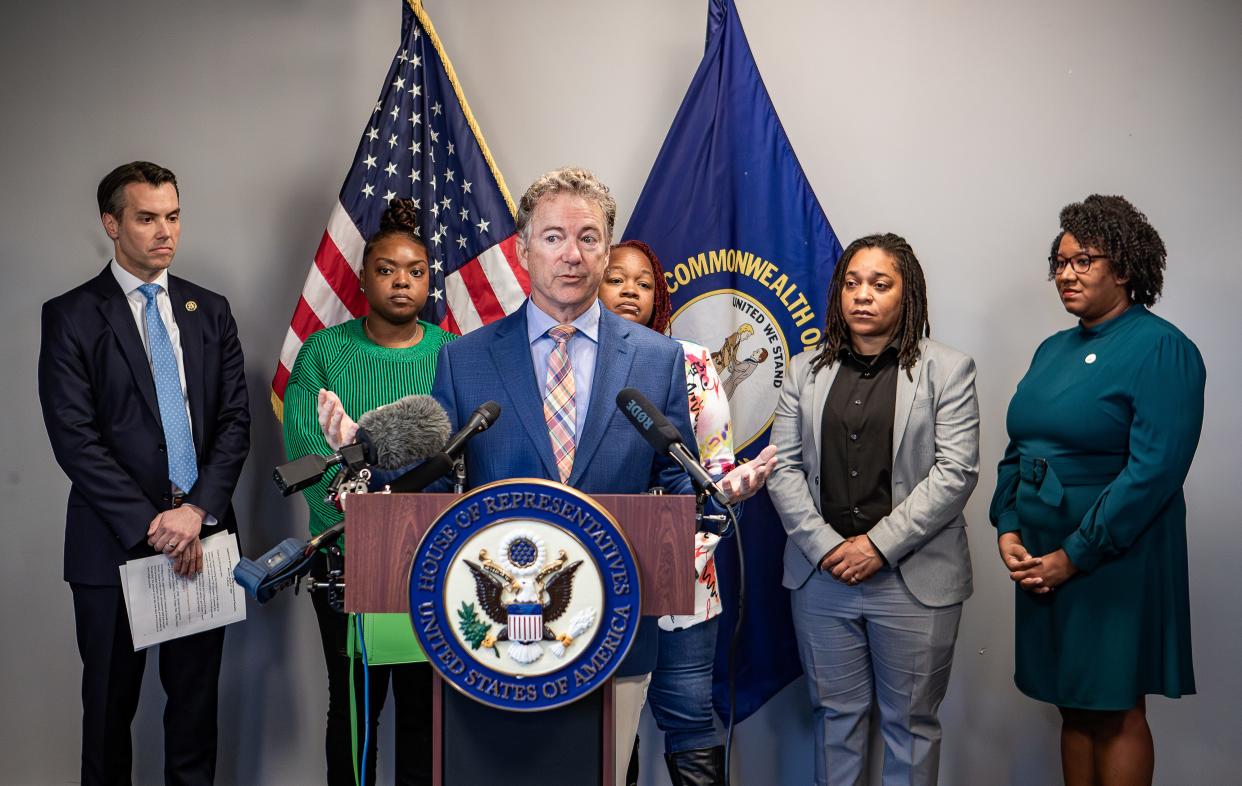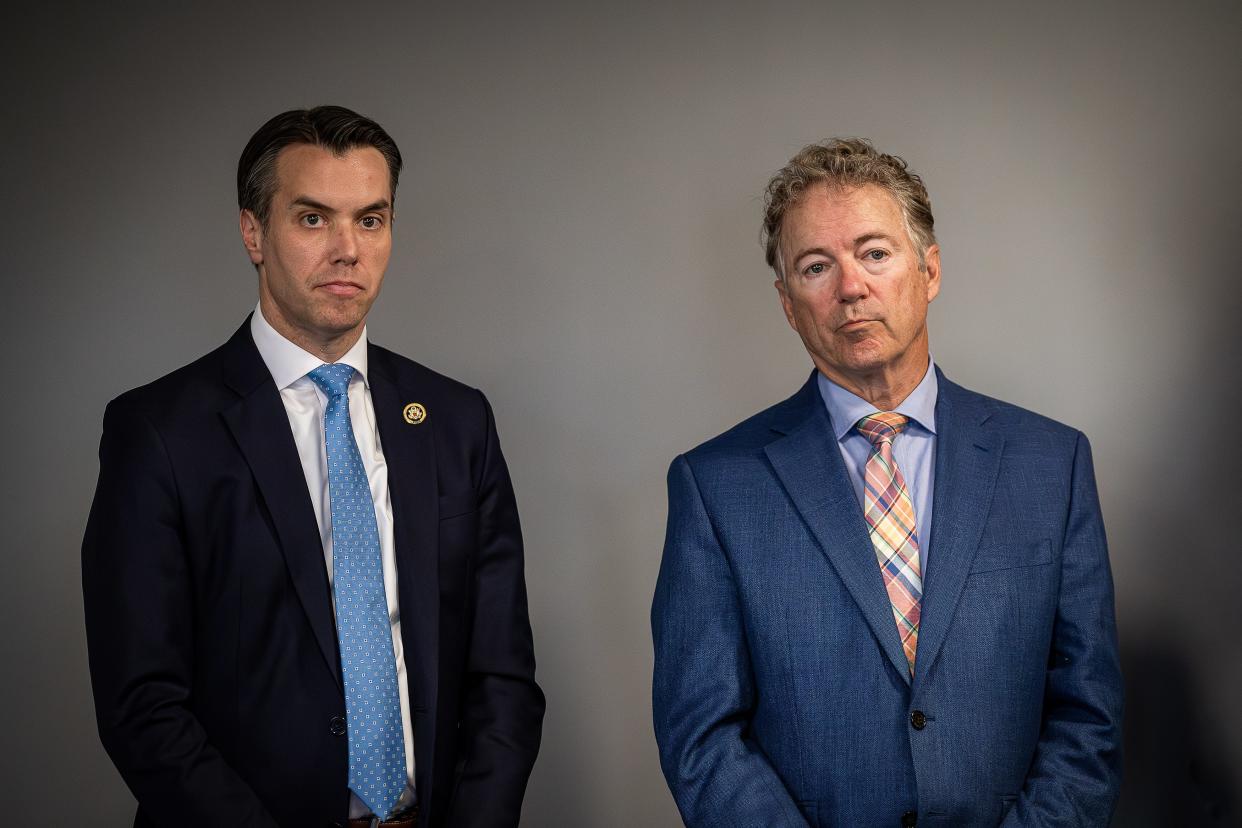4 years after Breonna Taylor died, Rand Paul, Morgan McGarvey team on no-knock warrant ban
Breonna Taylor's death at the hands of Louisville Metro Police officers was a watershed moment for the city that sparked protests across the nation.
Four years later, two U.S. legislators from Kentucky are working to ensure her killing leads to change at the national level.
Republican Sen. Rand Paul and Democratic Rep. Morgan McGarvey announced Monday they plan to file bills in the Senate and House of Representatives that would ban no-knock warrants like the one used by LMPD in the raid at Taylor's apartment in the early morning hours of March 13, 2020.
Taylor, a Black woman who was unarmed, was shot and killed by police at the scene. Her death led to daily protests in Louisville that summer and fall, as well as other demonstrations around the U.S. that took place in the aftermath of the police killing of George Floyd in Minneapolis.
A copy of the House bill provided to reporters is just two pages long. The "Justice for Breonna Taylor Act," as it's titled, states federal law enforcement officers "may not execute a warrant until after the officer provides notice of his or her authority or purpose."
It also requires state or local law enforcement agencies that receive federal funding from the U.S. Department of Justice to follow those rules.

No-knock warrants were banned in Louisville and significantly restricted throughout Kentucky in 2020, in the months after Taylor's death, and McGarvey noted 29 states around the U.S. have restrictions on the warrants. By tying the bill to federal funding, he said, the proposed legislation would ensure all states take action.
Paul introduced the same bill in June 2020 but it stalled in committee and didn't end up passing. He's confident this attempt will have a different outcome due to the legislation's bipartisan support — Sen. Cory Booker, a New Jersey Democrat, is also pushing for the bill to pass, he said.
"A lot of bipartisan bills pass, and sometimes things like this will break through," Paul said. "... One thing I will try, and I don't believe we tried last time, is just putting it out there and seeing if anybody objects."
Paul and McGarvey were joined at Monday's press conference by Taylor's mother, Tamika Palmer, who expressed support for the bill.
"I don't know a better way to commemorate coming up on the fourth year of Breonna's murder," she said. "I'm so grateful to have people in the room who continue to understand how important that what happened to Breonna never happens again."
None of the three officers who fired their weapons during the raid were convicted over her death — one, Brett Hankison, was charged with wanton endangerment over bullets that entered a neighboring apartment but was found not guilty. The city settled a lawsuit with her family for $12 million in September 2020.
But Attorney General Merrick Garland announced about two years later that four current and former LMPD officers would face federal charges over her death.
Three were charged over the warrant, with an indictment alleging they knew they lacked probable cause ahead of the raid and the warrant contained false information. One former officer has pleaded guilty as part of a plea deal while two others are awaiting trial. (Hankison was charged not over the warrant but over the shooting, a case that ended in a mistrial last November, but one federal prosecutors plan to retry.)
There were "so many things that went wrong" on the night of Taylor's death, McGarvey said, from the warrant's issue to the way the raid was carried out, with no body camera recording and no ambulance on site.
"I don't know that any of us can say what would or would not have happened four years ago," McGarvey said. "But what I can say is that if there was no no-knock warrant that happened that night, I don't think that it would have been carried out that way."

Last March, Garland returned to announce LMPD and Louisville Metro government would negotiate a federal consent decree after a DOJ investigation found the city and its police department had for years systemically violated the constitutional rights of its citizens, "especially against Black people." Those negotiations are still taking place, city leaders have said, and Paul and McGarvey declined to comment on their expectations Monday.
McGarvey encouraged supporters to reach out to their federal representatives to call on the to support the legislation. Representatives from Senate Minority Leader Mitch McConnell's office noted he'd called on fellow lawmakers to support legislation in 2020 to tighten no-knock warrant policies, while press secretaries for Reps. Andy Barr, James Comer, Brett Guthrie, Thomas Massie and Hal Rogers did not immediately respond to requests for comment Monday afternoon.
Reach Lucas Aulbach at laulbach@courier-journal.com.
This article originally appeared on Louisville Courier Journal: Justice for Breonna Taylor Act ban on no-knock warrants pushed again
